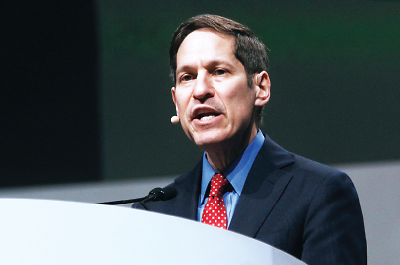“With a reciprocal revolution bringing together psychiatry and public health, we can affect deep societal change,” said Thomas Frieden, M.D., M.P.H., director of the Centers for Disease Control and Prevention, as he presented the William C. Menninger Memorial Convocation Lecture at APA’s 2016 Annual Meeting in Atlanta.
Frieden said depression and severe mental illness, alcoholism, opioid addiction, suicide, HIV/AIDS, and a host of other conditions are amenable to population-based solutions that look at how societal influences affect individual behavior and individual health.
“Broad and deep change is possible at the individual and societal levels when psychiatry and public health work together,” Frieden said.
Frieden was appointed CDC director by President Barack Obama in 2009. As CDC director, he led the nation’s response to the 2009 H1N1 influenza virus pandemic, and he launched the first-ever national paid anti-tobacco media campaign, “Tips From Former Smokers,” projected to help more than 100,000 smokers quit.
Prior to coming to the CDC, he was commissioner of the New York City Health Department from 2002 to 2009, where he directed the city’s anti-tobacco effort that led to the reduction in the number of smokers by 350,000 and cut teen smoking in half. Also, New York City became the first place in the United States to eliminate trans fats from restaurants, resulting in more than 50 national chains taking that step, and to require certain restaurants to post calorie information prominently.
From 1992 to 1996, as a CDC assignee, he led New York City’s program that rapidly controlled tuberculosis, including reducing the number of cases of multidrug-resistant tuberculosis by 80 percent. While working in India for five years as a CDC assignee to the World Health Organization, he assisted with national tuberculosis control efforts.
In his Convocation lecture, Frieden said the opioid abuse epidemic has required physicians to rethink how they manage and treat chronic pain, since many heroin addicts today began their addiction with prescription pain killers.
He also lamented the criminalization of people with mental illness. “It is simply unacceptable that prisons and jails are the largest institutions caring for the mentally ill in America,” Frieden said.
He was preceded at the podium by former First Lady Rosalynn Carter, a pioneering advocate for mental health and addiction treatment during her days in the White House. Carter described the work of the Carter Center, which is located in Atlanta, to decrease stigma and increase access to quality mental health care. ■

